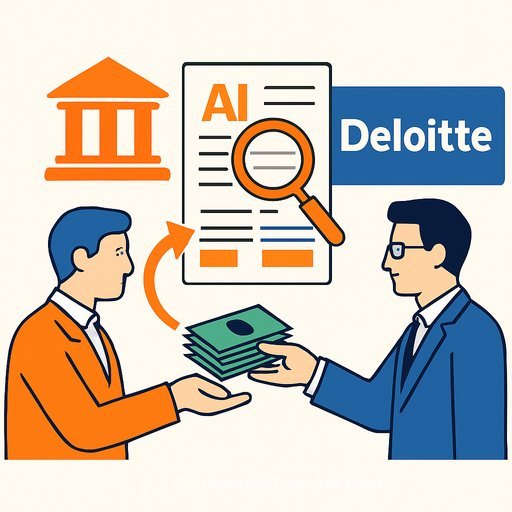Deloitte to partially refund government after AI-linked errors in $440,000 DEWR report
Deloitte will repay the final instalment of its contract after a Department of Employment and Workplace Relations (DEWR) report was found to contain errors linked to faulty references and footnotes. The firm has acknowledged using a generative AI large language model (Azure OpenAI GPT-4o) via a tool chain licensed by DEWR and hosted on DEWR's Azure tenancy.
The report has been corrected, with deleted references, revised footnotes, and a new reference list. Deloitte did not confirm whether AI caused the mistakes, stating only: "The matter has been resolved directly with the client."
What happened
DEWR commissioned Deloitte in December 2024 to review its targeted compliance framework and IT system. The report, published in July, contained more than a dozen issues in citations and footnotes and has since been updated. A DEWR spokesperson confirmed Deloitte will repay the final instalment under the contract once the transaction is finalised.
University of Sydney welfare academic Chris Rudge identified made-up references, including one incorrectly titled "The Rule of Law and Administrative Justice in the Australian Social Security System," which does not exist. "I was in no doubt, when I read the names of the works, that they were fake because I work in the area and I know my colleagues' work," he said. "Once I discovered one, I just discovered more and more."
Rudge said the mistakes carried "all the hallmarks" of AI: "I cannot understand how a human could create titles of works that don't exist, that don't appear on Google. How would they do that?" The updated report notes a "small number of corrections to references and footnotes" that it says do not affect the report's findings or recommendations.
Why this matters for government teams
This incident highlights a simple truth: if vendors use AI, agencies need controls that verify outputs before acceptance and payment. References, citations, and factual claims require human checks by subject matter experts, with clear accountability for errors.
Practical steps for agencies and procurement leads
- Mandate AI disclosure: Require vendors to declare any AI tools, models, and prompts used, including hosting environment and data handling.
- Set acceptance criteria: Include verifiable citation checks, SME review of references, and a documented evidence pack for sources.
- Hold back payments: Withhold final instalments until verification is complete; include remedies for factual or citation failures.
- Audit the tool chain: Reserve the right to review logs, prompts, and outputs, especially when tools run inside your tenancy.
- Protect information: Ensure AI usage complies with security, privacy, and records obligations; store artifacts and versions in agency systems.
- Require version control: Track edits, corrections, and errata; republish with a clear change log when updates are made.
- Train internal reviewers: Equip policy and program teams to validate AI-assisted work, especially citations and footnotes. Consider role-based upskilling via skills-aligned courses.
Governance references
Bottom line
AI can speed up drafting, but it doesn't excuse unverified content. Build AI-specific contract terms, enforce verification before payment, and keep human experts accountable for the final word.
Your membership also unlocks:






